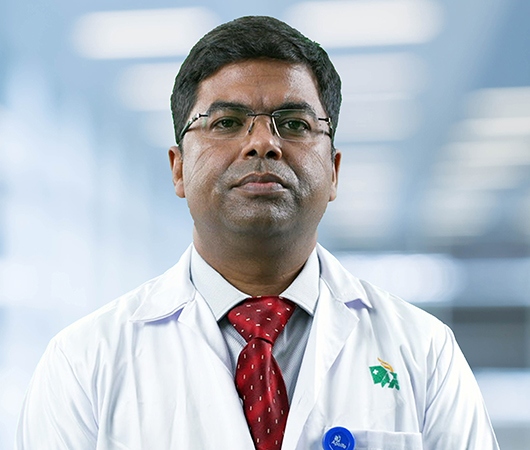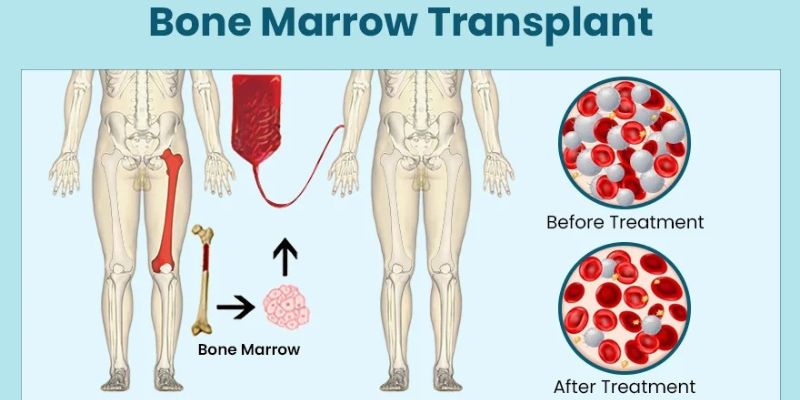Bone Marrow Transplant (BMT): A Life-saving Cancer Treatment
Bone marrow transplant (BMT), also known as stem cell transplant, is an essential treatment for various cancers like leukemia, lymphoma, and multiple myeloma. It involves replacing damaged or diseased bone marrow with healthy stem cells, either from the patient’s own body (autologous transplant) or a donor (allogeneic transplant). BMT is used to restore the body's ability to produce healthy blood cells and strengthen the immune system to fight cancer.
At Healtour Solutions, we help you access advanced BMT treatment in India, connecting you with renowned oncologists and hospitals for personalized care tailored to your specific cancer type.
Types of Bone Marrow Transplant (BMT)
- Autologous Bone Marrow Transplant (Auto BMT):
- Definition: Involves transplanting the patient's own healthy stem cells after chemotherapy or radiation treatment.
- Indications: Commonly used for cancers like lymphoma, multiple myeloma, and some solid tumors.
- Process: Stem cells are collected from the patient's bone marrow or blood before treatment, stored, and then re-infused after cancer treatment.
- Allogeneic Bone Marrow Transplant (Allo BMT):
- Definition: Involves receiving stem cells from a matched donor (usually a relative or an unrelated donor) whose immune system is compatible with the patient.
- Indications: Used for more severe cases of blood cancers, such as leukemia, or in patients with genetic disorders.
- Process: Stem cells are collected from the donor’s bone marrow, peripheral blood, or umbilical cord blood and transplanted into the patient.
- Umbilical Cord Blood Transplant:
- Definition: A type of allogeneic transplant using stem cells from the umbilical cord blood of a newborn baby.
- Indications: Can be used in cases where a matched donor is not available.
- Process: The umbilical cord blood stem cells are collected at birth, frozen, and stored for future use.
Benefits of Bone Marrow Transplant for Cancer
- Restores Blood Production: BMT helps in restoring the body’s ability to produce red blood cells, white blood cells, and platelets.
- Fights Cancer Cells: Especially effective in treating blood cancers such as leukemia, lymphoma, and myeloma.
- Enhanced Survival Rates: In certain cancers, BMT significantly improves survival rates by enabling the patient’s immune system to fight cancer more effectively.
- Prevents Recurrence: A successful transplant can reduce the risk of cancer returning by providing the body with a fresh supply of healthy stem cells.
- Improves Quality of Life: Once recovery is complete, patients often experience an improved quality of life and better long-term health.
Symptoms Indicating the Need for Bone Marrow Transplant
Bone marrow transplant may be recommended if the following symptoms are present, indicating blood cancer or bone marrow failure:
- Unexplained weight loss
- Frequent infections or persistent fevers
- Unusual bleeding or bruising
- Shortness of breath or fatigue
- Pale or anemic appearance
- Swollen lymph nodes or spleen
- Bone pain or joint discomfort
Causes of Cancer That Might Require Bone Marrow Transplant
Bone marrow transplant is often considered for patients with cancers that affect the blood and bone marrow, including:
- Leukemia: A cancer of the blood and bone marrow that results in the abnormal production of white blood cells.
- Lymphoma: Cancer of the lymphatic system that can affect bone marrow function.
- Multiple Myeloma: A cancer of plasma cells that impacts bone marrow and can lead to bone damage.
- Aplastic Anemia: A rare condition in which the bone marrow fails to produce enough blood cells.
- Genetic Disorders: Certain inherited blood disorders may also require BMT for treatment or management.
Bone Marrow Transplant Treatment Process
- Initial Consultation and Diagnosis:
The first step is a comprehensive evaluation to determine if you’re a suitable candidate for BMT. This involves blood tests, bone marrow biopsy, imaging studies, and genetic testing to assess the type of cancer and its stage.
- Pre-transplant Conditioning:
Patients undergo chemotherapy, radiation therapy, or both to destroy the diseased bone marrow and make space for the new stem cells. This is known as conditioning therapy.
- Stem Cell Collection:
For an autologous transplant, stem cells are harvested from the patient’s own bone marrow or blood. For an allogeneic transplant, stem cells are collected from a donor, and a match is verified through HLA (human leukocyte antigen) typing.
- Transplantation:
The stem cells are infused into the patient's bloodstream through an intravenous (IV) line. The procedure is similar to a blood transfusion.
- Recovery and Monitoring:
After the transplant, the patient is closely monitored in the hospital for several weeks to ensure that the new stem cells begin to grow and produce healthy blood cells. This period is critical as the patient’s immune system is weak and susceptible to infections.
- Post-transplant Care:
Ongoing care is essential for several months after the transplant to monitor the recovery process, manage side effects, prevent infections, and ensure the success of the transplant.
Side Effects of Bone Marrow Transplant
Bone marrow transplant is a complex procedure and can lead to side effects, such as:
- Graft-versus-Host Disease (GVHD): A condition where the donor’s immune cells attack the recipient’s tissues. This is a potential risk in allogeneic transplants.
- Infections: Due to a weakened immune system during the recovery period.
- Fatigue: Common during the recovery phase as the body rebuilds its blood cell counts.
- Mouth sores and nausea: As a result of chemotherapy or radiation.
- Liver and kidney problems: Caused by high doses of chemotherapy.
- Anemia or low platelet counts: Can occur in the recovery phase but typically resolves as the bone marrow regenerates.
While side effects are common, they can be managed with medical interventions, and many patients recover well after the procedure.
Why Choose Healtour Solutions for Bone Marrow Transplant in India?
- Top Oncologists: We connect you with leading cancer specialists in India, ensuring that you receive the best possible care.
- Affordable Treatment: BMT in India is available at significantly lower costs compared to many Western countries, with high-quality care.
- State-of-the-Art Hospitals: We work with some of the best cancer centers in India, offering world-class facilities and advanced technologies.
- Personalized Support: From the initial consultation to post-transplant care, Healtour Solutions provides end-to-end support to international patients seeking BMT in India.
Step-by-Step Guide to Bone Marrow Transplant (BMT) Treatment
- Consultation and Evaluation:
Meet with an expert oncologist to determine if a BMT is appropriate for your cancer type, followed by necessary diagnostic tests.
- Pre-Transplant Conditioning:
Undergo chemotherapy and/or radiation therapy to prepare your body for the stem cell infusion.
- Stem Cell Collection:
Stem cells are harvested from either the patient’s bone marrow (auto BMT) or a donor (allo BMT).
- Transplantation Procedure:
The stem cells are infused into your bloodstream to begin the process of rebuilding your bone marrow and immune system.
- Recovery and Monitoring:
Stay in the hospital for several weeks to monitor progress and manage side effects.
- Post-Transplant Care:
Continue follow-up appointments to track recovery, manage complications, and ensure the success of the transplant.
Contact Us for Bone Marrow Transplant in India
If you are considering bone marrow transplant as part of your cancer treatment, Healtour Solutions can help you connect with leading hospitals and oncologists in India. We offer affordable, high-quality care for international patients and provide complete support throughout your treatment journey. Contact us today to learn more about Bone Marrow Transplant in India and how we can assist you.
FAQs About Bone Marrow Transplant for Cancer
1. What is bone marrow transplant (BMT)?
BMT is a medical procedure where diseased or damaged bone marrow is replaced with healthy stem cells to treat blood cancers.
2. How long does the BMT procedure take?
The transplant itself typically takes a few hours, but the entire treatment process, including pre-transplant preparation and post-transplant recovery, takes several weeks.
3. What are the risks of BMT?
The main risks include infections, graft-versus-host disease (GVHD), and organ toxicity from chemotherapy.
4. Is BMT painful?
The procedure itself is not painful, but recovery can be challenging, with fatigue, nausea, and other side effects common in the early stages.
5. How successful is bone marrow transplant for cancer?
The success rate depends on factors such as cancer type, patient health, and how well the body accepts the transplant. For some cancers, BMT can offer a long-term cure.
6. Can a bone marrow transplant cure cancer?
BMT can significantly increase the chances of remission or cure, especially for blood cancers like leukemia and lymphoma.
7. How do I find a bone marrow donor?
In the case of an allogeneic transplant, Healtour Solutions works with hospitals that have extensive donor registries and can assist in finding a matching donor.
8. What is the recovery time after BMT?
Recovery varies by patient but typically takes several months, during which the patient will need to be monitored closely.
9. Is bone marrow transplant available in India?
Yes, India has several hospitals offering advanced bone marrow transplant treatments with success rates comparable to those in Western countries.
10. What is the cost of bone marrow transplant in India?
The cost ranges from $15,000 to $40,000, depending on the type of transplant and hospital.




